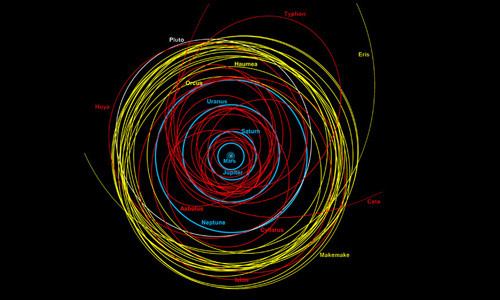The giant comet piece can wipe out life on Earth
A comet attack that wiped out previous dinosaurs will most likely repeat once again wipe out all life on the planet.
According to RT, recent discoveries about hundreds of giant comets outside the solar system make astronomers have to issue warning bells. They say these objects move in an unstable orbit and may overflow into the solar system to create comet fragments that pose an "inevitable" danger to the Earth.
Researchers from Armagh's Astronomical Research Institute in Ireland and Buckingham University on December 22 warned that the discovery of hundreds of our outer comets in the last two decades has increased the risk of life. on the planet may be wiped out by comet fragments rather than asteroids.
They published the study in the A&G magazine December edition of the Royal Astronomical Society of England. According to the study, hundreds of giant comets that are 50-100km across, or even larger, are moving on an unstable elliptical orbit through the orbits of large planets like Jupiter and Saturn, why Uranus and Neptune.

The orbits of planets in the solar system, in which hundreds of microscopic planets have an unstable orbit, are represented by red lines.(Photo: Royal Astronomical Society).
The gravitational field of large planets is capable of pushing these objects, also called micro-planets (centaurs) , from its orbit toward Earth. Micro-planet is an unstable orbital layer of small planets with characteristics of both asteroids and comets.
"While approaching close to the Earth's space, they may break into dust and large fragments enter the solar system, causing inevitable impacts on our planet , " the group said. study said.
The planet micro-shaped like a ball filled with ice and dust, has a greater mass than the entire population of asteroids that pass through Earth ever discovered.
"In the last three decades, we have been trying to monitor and analyze the risk of collisions between Earth and asteroids," said Professor Bill Napier, Buckingham University. He stressed that it is necessary to explore areas farther from Jupiter's orbit to find micro-planets because they can be a potential danger and this is the time to learn more about them.
Astronomers calculate that a collision scenario can occur in cycles of 40,000 - 100,000 years.
"Some major catastrophes in the past, such as the extinction of dinosaurs 65 million years ago, may be related to the Earth hypothesis colliding with this giant comet," the team said. after comparing many records of geologists and paleontologists.
- Comet is brighter than the full moon visiting Earth in 2013
- Piece of comet helps discover Earth origin
- Comet bombs life bombs on Earth
- Video: Comet hit the sun
- Meteors can bring life first to Earth
- The moment comets destroy mammoths on ancient stone pillars
- Comet 'century' approaches the Earth
- Comet detection is the brightest century
- The new comet is approaching the sun
- How big a meteorite can wipe out life on Earth?
- Comets cause huge fire rain on Earth
- The brightest blue comet in the sky rushes towards Earth
 10 famous Isaac Newton inventions
10 famous Isaac Newton inventions 'Doomsday 2021' and Mayan conspiracy theories
'Doomsday 2021' and Mayan conspiracy theories 7 perspective of the destruction of the Earth
7 perspective of the destruction of the Earth Isaac Newton predicted the world would end in 2060
Isaac Newton predicted the world would end in 2060